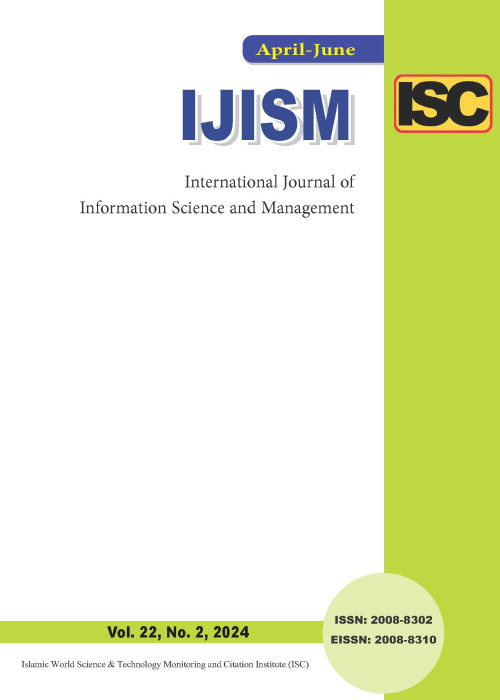فهرست مطالب
International Journal of Information Science and Management
Volume:12 Issue: 2, Dec 2014
- Special Issue
- تاریخ انتشار: 1393/03/31
- تعداد عناوین: 7
-
-
Page 7Despite criticism and allegations of suppressing innovative ideas, Peer Review is widely cited as central in evaluation of manuscripts submitted to journals for publication. Peer Reviewers along with editors who are known as gatekeepers help improve the quality of the manuscripts. One of the primary responsibilities of the Editor is considered to create and maintain a high quality productive group of reviewers. In order to retain good reviewers, it is essential to give them due respect, recognize their services, refrain from over burdening the good reviewers, have some CME Credit for this activity, look at different ways of rewarding the reviewers i.e. providing good reading material, books, appreciation certificates, post review thanks letters besides elevating the good efficient reviewers to the Editorial Board. Publishing their name at the end of the year, concession in publication charges if they are authors or co-authors in manuscripts received for publication besides awarding distinguished reviewers are some of the measures that can prove fruitful.Keywords: Good Peer Reviewers, Recognition, Appreciation
-
Page 13International research collaboration is when researchers from various nations working together to achieve the common goal of producing new scientific knowledge and internationally co-authored papers are used to measure collaborative international research activity. The benefits of international research collaboration includes sharing of developed scientific knowledge and skills, and improve research quality, while in terms of collaborative journal publishing, it could contribute to publications in high impact journals and, increase the citation and visibility of researchers. International collaborative research activity and publishing is beneficial particularly to low-resources countries such as those in the Asia Pacific region. However, Asia Pacific region holds multi-ethnic, multi-cultural, populous, poor and growing ageing populations and these factors posed limitations to international research collaboration and journal publishing such as: lack of resources in terms of financial, institutional and government support; geographical distance; language barrier; lack of research skills; the challenge of acceptance into international journals; the lack of journals which represent the Asia Pacific region and lastly issues in managing the journals including financial, establishing a peer review and journal management, and operation guidelines. Efforts to address the challenges and promote journal publishing and international research collaboration in the region are warranted.Keywords: journal publication, international research collaboration, bibliometrics, Asia Pacific
-
Page 21Scholarly communication as a social activity needs rethinking since this process is in the monopoly of commercial publishers. Authors and their institutions as well as librarians had been working to achieve unrestricted access to research output. In this regard, many researchers around the world gathered in Budapest on February 2002 to decide on global access to publications free of legal and price barriers. This campaign leads to issuing the declaration Budapest Open Access Initiative. This global and scientific gathering was the starting point for open access movement. This new paradigm in scholarly communication is discussed in this paper from price, legal, and business approaches. In relation to open access policies, green and gold routes as well as new licences in terms of Creative Commons are considered. Finally, I concluded that higher education institutes should provide suitable infrastructure to make researchers works accessible to others. At the same time, custodians of higher education have to legislate for new policies to mandate their researchers to publish the outputs in institutional and subject-based repositories.Keywords: open access policy, journal price crisis, journal permission crisis, creative commons, institutional repository, subject, based repository, golden route, green route
-
Page 29Review articles are considered to act as a solution for the information overload problem, especially in different scientific fields. The purpose of a good review is to supply reasoned and developed arguments, which is an indispensable ingredient in scientific literature. Thus the result should be a rich, condensed, timely, yet exhaustive source which provides all the necessary information and costs less Time. This paper aims at clarifying the added values of a good review article, its typology, and the qualifications it should have. On the other had the paper articulates some simple steps on should take to develop a plausible review.Keywords: review articles, information overload, scientific journals, narrative reviews, systematic reviews
-
Page 39Journal performance metrics are designed to help users know the best journals in different scientific fields. In this article, some journals indexed in ISC database are compared using Scopus and ISC performance indicators. The Scopus journal analyzer uses SNIP and SJR as alternatives for IF which consider citation analysis differently. New performance indicators consider differences in citation behavior across different research fields. ISC performance indicators are a new feature added to the ISC database which results showed its efficiency in evaluating Persian scientific journals.Keywords: Journal Performance Metrics, SNIP, SJR, ISC Journal Performance Indicators
-
Page 53This paper presents XML-based Journal Submission System (XML-based JSS) α and β as one of the RICeST tools for the ease of journal submission process by users. XML-based JSS version β is a derivative version of the XML-based JSS version α by improving the system from many aspects. The reader will learn about RICeST and ISC, XML, and the method used in various versions of XML-based JSS to submit their journal through the RICeST website. XML-based JSS (α and β) is a user friendly tool that would ease journal managers as well as editorial board of journal to submit their journal through RICeST website in a simple way.Keywords: Regional Information Center for Science, Technology (RICeST), Islamic World Science Citation Center (ISC), Extensible Markup Language (XML), XML, based Journal Submission System (XML, based JSS)


